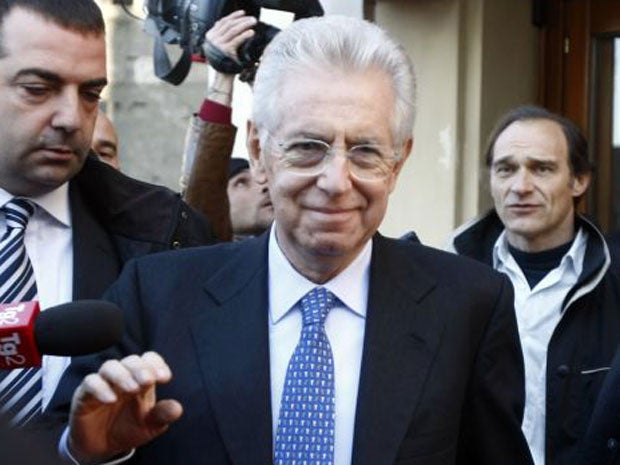Italy's new premier Mario Monti rushes to build new government

Your support helps us to tell the story
From reproductive rights to climate change to Big Tech, The Independent is on the ground when the story is developing. Whether it's investigating the financials of Elon Musk's pro-Trump PAC or producing our latest documentary, 'The A Word', which shines a light on the American women fighting for reproductive rights, we know how important it is to parse out the facts from the messaging.
At such a critical moment in US history, we need reporters on the ground. Your donation allows us to keep sending journalists to speak to both sides of the story.
The Independent is trusted by Americans across the entire political spectrum. And unlike many other quality news outlets, we choose not to lock Americans out of our reporting and analysis with paywalls. We believe quality journalism should be available to everyone, paid for by those who can afford it.
Your support makes all the difference.Italy's premier-designate Mario Monti began talks today to create a new government of non-political experts tasked with overhauling an ailing economy to keep market fears over the country from threatening the existence of the euro.
Investors initially cheered Monti's appointment, following quickly on Silvio Berlusconi's weekend resignation, though concern lingered about the sheer amount of work his new government will have to do to restore faith in the country's battered economy and finances.
President Giorgio Napolitano tapped Monti yesterday to create a government capable of implementing economic reforms aimed at reviving stagnant growth to bring down public debt, stuck near 120 per cent of GDP.
Monti pledged to act "with a sense of urgency" to identify ministers in the new government but said he would also take the time necessary to secure a strong team. He was meeting various political parties throughout the day to garner support for his mission.
The head of the lower chamber of Parliament, Gianfranco Fini, said he expects the new Monti government to be confirmed by Friday. Under pressure from markets, Italy's political machinery has been moving with rare efficiency — both houses passed fresh austerity and reform measures within two days, paving the way for Berlusconi's resignation.
Improving market confidence in Italy is crucial to the future of the eurozone as the country would be too expensive to rescue. A default on its 1.9 trillion euro debt would cause massive chaos in financial markets and shake the global economy.
As in Greece, where a new government of technocrats also took over last week, the hope is that administrations of experts not affiliated to parties will be more willing to make the tough but necessary decisions that politicians have so far balked at.
Monti appeared to have the respect of many Italians, eager to see an end to the financial crisis that threatens their own well-being.
"In my opinion he will be better than what we had before, obviously. He seems to me to be a person who is serious, normal and with experience," said Bernardo Albrigo, in the Campo Dei Fiori open-air market in central Rome.
The next six months will be a tough test of the Italian government's ability to restore credibility in its finances — some 200 billion euro in public debt comes due through the end of April.
Today, Italy easily raised 3 billion euro in the sale of five-year bonds, though at a higher cost. Investors demanded an interest rate of 6.29 per cent for the bonds, the highest level since 1997, compared with 5.32 per cent at a similar auction a month ago.
The auction result highlighted how it will take time to bring Italy's borrowing rates significantly lower after spiking last week well above the 7-per cent level that eventually forced three other eurozone countries to need bailouts.
Today, the yield on Italy's benchmark 10-year bonds fell as low as 6.28 per cent before stabilising around 6.40 per cent — still uncomfortably high for the country. The yield is indicative of the rate the government would pay if it were to tap financial markets to raise cash.
Monti said yesterday that he would act "with a sense of urgency" to identify ministers in the new government but said he would also take the time necessary to secure a strong team. He will be meeting with various political parties throughout the day to garner support for his mission.
Monti must now draw up a cabinet, lay out his priorities, and see if he has enough support in parliament to govern. Rival political parties offered various degrees of support, including one demand from Berlusconi's party — the largest in parliament — that his government last only as long enough as it takes to heal Italy's finances and revive the economy.
"In a moment of particular difficulty for Italy, in a troubled global and European context, the country must win the challenge to redeem itself. Italy needs to return to being an element of strength and not weakness in the European Union, of which we were founders and in which we need to be protagonists," Monti said yesterday.
The 68-year-old economics professor proved his mettle as European competition commissioner in the 1990s. But he'll have to win a confidence vote in parliament before he can lead the nation.
Despite his resignation, Berlusconi pledged to continue playing a role in Italian politics.
"Berlusconi made his position very clear when he left yesterday. He sent a video message to Italy saying that he is not finished," said James Walston, a political analyst at the American University of Rome. "So at the moment he is certainly not retired, he is not the retiring type."
AP
Join our commenting forum
Join thought-provoking conversations, follow other Independent readers and see their replies
Comments